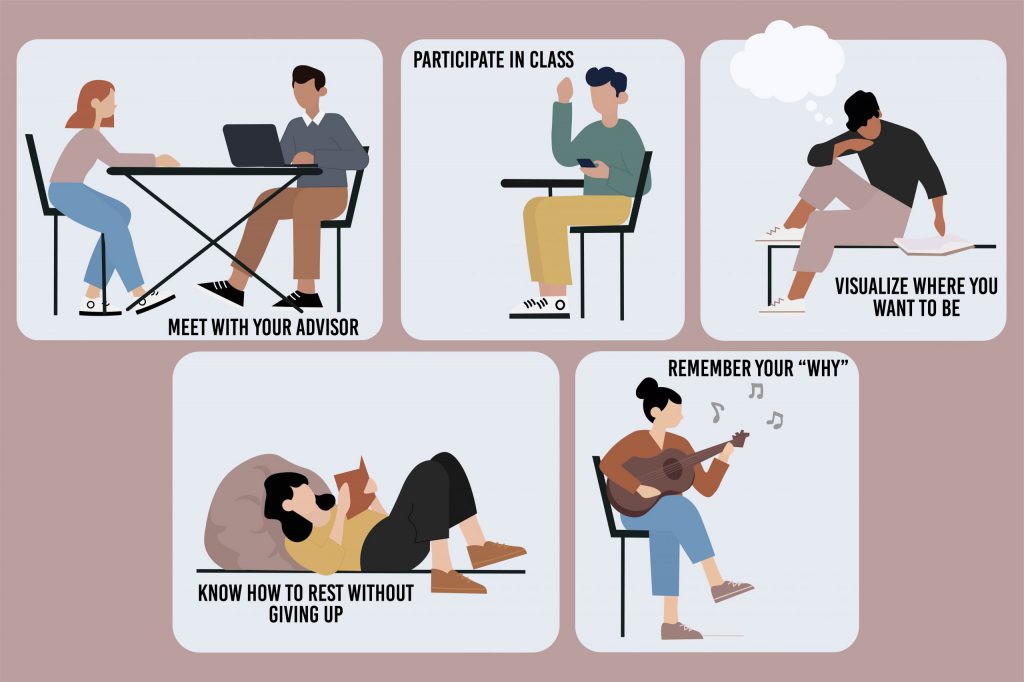Feeling the pressure of balancing life and school is not something uncommon for nontraditional students.
Whether you are a parent attending college trying to balance homework, changing diapers and a job, or a student who struggles to understand the material presented in class because of a learning disability, you are considered a nontraditional student.
As a nontraditional student, it can become easily overwhelming having to deal with the stress of attending class, getting adequate grades, completing homework assignments and fulfilling graduation requirements when also facing the personal issues that arise.
Nontraditional students, if you are feeling the multiple pressures of college, home and social life creeping your way, take a deep breath. These tips are for you:
Use your resources immediately.
“Students have repeatedly heard about the student services here at Dixie State University, and most of the time they initially think ‘I don’t need it,’ which is a huge mistake,” said Jonathan Morrell, director of Student Support Success. “When they begin to falter, that is when some students seek help.”
DSU offers a student support service called TRiO, which assists first-generation students, low-income students, students with disabilities, and students who have returned back to college after hiatus, Morrell said.
“We are here to help students and provide them with the adequate assistance needed to be successful here at DSU,” said Beverly Clark, Disability Resource Center assistant. “They just need to be proactive about seeking help and asking questions.”
Clark said nontraditional students have plenty of resources and support services to choose from, such as the Disability Resource Center, the Tutoring Center, the Writing Center and the Booth Health and Wellness Center.
“I have used the Disability Resource Center to help me because of my ADHD,” said Haley Hedricks, a sophomore Integrated Studies major from Portland, Oregon. “As long as I applied and showed documentation, I was able to get accommodations for when I have to take tests.”
Hedricks said the process is easier and more efficient than a lot of nontraditional students may initially think when applying for help at student support services.
Manage your time strategically.
“When I talk to my nontraditional students, I generally find that time management is the biggest factor in college success,” Morrell said.
Some nontraditional students are juggling a job, a family, classes and homework, and it is important that they do not overload their schedules, which will lead to overwhelming feelings and frustration. Instead, these students should focus on strategically building a schedule that will balance school, home and social life, Morrell said.
“I recommend that students set aside a part of their day to let their brains rest,” Clark said. “Whether it be taking a short break from studying or taking care of the kids. Nontraditional students should find a coping balance from doing their work to having time for themselves.”
Clark said that DSU offers yoga, pickle-ball or art classes that can give students a mental break throughout the week. Nontraditional students should take elective classes that they are interested in as a hobby because it can eliminate stress.
“Think to yourself, ‘if I have to spend this much time in class, how much time will I need to set aside for homework, my job and my family,’” Morrell said. “Do not overwork yourself while trying to prove that you can go above and beyond in school as a nontraditional student. Know yourself and what you can mentally take.”
Don’t be afraid to ask questions.
Have you ever felt too nervous to ask a question? Have you ever been too ashamed to ask for help?
“Several students don’t ask questions, they don’t seek out help and they just struggle with an issue quietly,” Morrell said.
It is important for nontraditional students to get all the assistance they need in order to get their degree, Clark said. They can only achieve this if they aren’t afraid to ask questions or inquire for help.
“People don’t know you need help unless you ask,” Clark said. “There is no reason to have to go through your struggles alone. That is why [the staff of student services] are here.”
Hedricks said it is common for nontraditional students to be too afraid to ask questions because they do not want to seem incapable of being able to accomplish a certain goal, look like they are dependent on others, or feel as if they are asking for too much.
“If somebody who isn’t even eligible for our services walks through that door looking for help, we would never turn them away,” Clark said. “We will do our best to lead them to the right place where they can really find a solution to their specific problem. “
Create good connections with administration, staff and peers.
Networking is a huge key to becoming successful. It is important to not only make connections with DSU administrators and staff but also your peers, Clark said.
“After making these connections with your administrators, professors and classmates, it will give you more of a sense of belonging at DSU.”
Beverly Clark, Disability Resource Center assistant
Clark said that plenty of nontraditional students may feel a lot of separation from traditional students because of an age gap, maturity level, cultural difference, financial differences, or any other major differences.
“You never know who is going to give you the help you need,” Clark said. “After making these connections with your administrators, professors and classmates, it will give you more of a sense of belonging at DSU.”
Typically, nontraditional students attend class and eagerly rush home either because they have a family or job to tend to. By taking the time to explain your situation to your professor or get to know your academic advisor, you are setting up an atmosphere where you can really be yourself and get all of the assistance you need.
“On the first day of class, I always introduce myself to my professors after class and explain to them that I work with the Disability Resource Center for my learning disability,” Hedricks said. “My professors are always understanding and are willing to work with me so I can take my exams in a private room with more time to focus.”
Enjoy your time as a college student.
Nontraditional students can still have a fun time in college despite their everyday struggles, Hedricks said.
“I love being able to attend as many school events as possible,” Hedricks said. “It helps me connect to the student body and get to know more people. It helps me forget about the stress of having ADHD.”
Clark said it is helpful for nontraditional students to get out of their comfort zone and attend school events such as the weekly DSUSA or sporting events. There they can make more social connections with their peers and eliminate their ideas of feeling different from traditional students.
“Going to the events take my mind off of my job, all my homework, projects, and other responsibilities,” Hedricks said. “College is about getting your degree, but that shouldn’t take away from your ability to have fun and enjoy the moment.”



